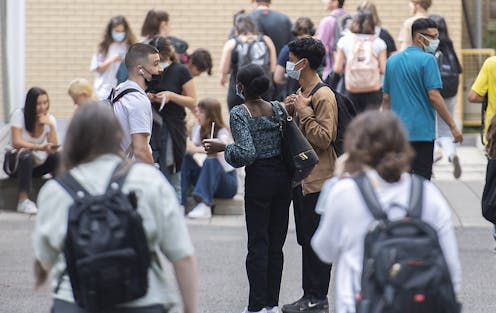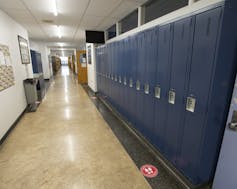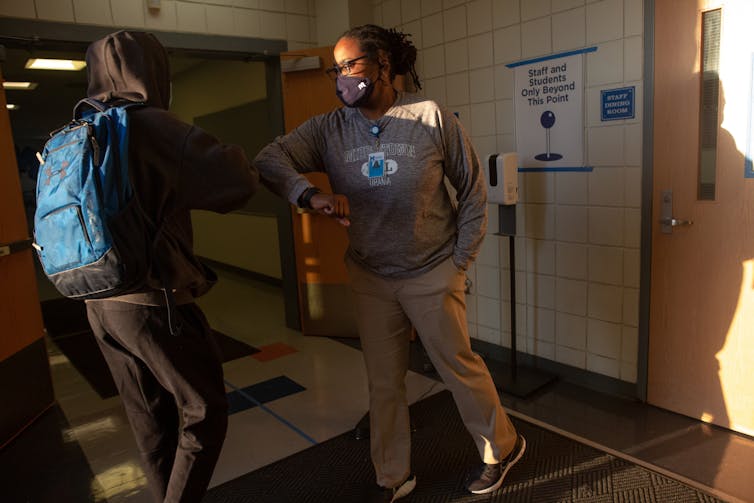
If you could redesign high school, what might you change? How could the schedule be more flexible? What if teachers worked together as teams? What if groups of students were combined based on interest and given the opportunity to connect learning to their everyday lives?
Noel Burke, the founder of an educational reform initiative in Québec called NEXTschool, has been asking these questions for years.
After working as a teacher, administrator and government official, Burke travelled to innovative high schools in New Zealand and Southern California and met with educators throughout Canada with the goal of figuring out how he might help empower schools in Québec to “better align with the learning needs of students in the 21st century.”
Designed for industrial revolution
Like most educational institutions across Canada, Québec English high schools retain structures designed for the industrial revolution to support shift work and a culture of management.

Today though, the realities of students’ lives have transformed, and schools are slowly adapting to a knowledge-based economy and unpredictable ecological and social challenges.
As part of a Social Sciences and Humanities Research Council funded research project, we belong to a team of researchers from McGill’s Department of Integrated Studies in Education studying educational change.
Working alongside Burke, we examined new models of education that emphasize learning opportunities that connect to what high school students care about and what they need to know for our future.
New models for schooling
These new models often feature flexible timetabling, project-based learning, co-curricular crediting where students earn credits for participating in extracurricular activities, and learning hubs that offer small groups of students academic and other holistic supports.
To date, we have worked alongside teachers from several local Québec English high schools to consider their creative, context-specific responses to how they’d redesign school. We have also been engaging students in activities to ensure that teachers and administrators know what students really want and need from school.
Read more: Machines can't 'personalize' education, only people can
Teachers discussed concerns such as replacing homeroom with flexible blocks where students can access academic support and turning campus green spaces into shared instructional areas.
We adapted a participatory visual research method called photovoice to invite student input. Students explored their educational problems and aspirations by taking photographs around their school, displaying them and then gathering with classmates and teachers to discuss what their photos mean to them.
Teachers have consistently been surprised by students’ concerns and suggestions — highlighting the importance of finding ways to involve genuine student input into educational change.
Teachers as agents of change
For a reform like NEXTschool to be successful, Burke agrees that students must be involved more authentically and more often. But he believes teachers are the ones who need to be positioned as the “project implementors” and “agents of change.” He shared this with us over the course of several interviews we held with him in summer 2022.
Burke is aiming to empower teachers as the frontline workers best able to facilitate the changes needed for lasting educational reform. He suggested schoolboards have to follow teachers on the path they want to go rather than showing them the path based on top-down policy.
Read more: Teachers are on the front lines with students in the coronavirus pandemic
Research has shown that conventional reforms driven from the top down are rarely aligned with the path teachers believe best for their classes.
NEXTschool aims to centre teachers’ understanding of their teaching and school while balancing the voices of students in expressing their learning needs.
The project engages teachers around the key features of space, time and learning in ways that function more like a menu as opposed to a recipe. Burke’s position is that educational partners benefit from having options laid out with the repercussions of choices unpacked. For example, if teachers choose to pursue flexible timetabling, they benefit from understanding how it impacts teacher planning time.
‘How can we make this happen?’
Burke believes educational change is more likely when teachers are trusted in determining what changes are needed and how to go about them.
This means that, as Burke explained, NEXTschool is an evolving model amenable to a variety of settings, where local control and student engagement drive the reform.
Burke conceded that even with his confidence in teachers, he is aware of the vital role administrators play in supporting teachers to take the necessary risks to innovate schools.
Burke suggests administrators’ primary role is helping mitigate the risk teachers take when trying new things in the classroom. Administrators must ask teachers: “How can we make this happen and how can I help you with this?”
Read more: To serve school communities and address inequities after COVID-19, principals must become activists

System now intolerant of risk-taking
Teachers often feel unable to take risks because, as Burke described, they feel the system is intolerant of risk-taking.
In the compliance culture common to educational institutions, teachers and students have to navigate the top-down management that prescribes rigid scheduling requirements, discrete subject area focuses, standardized ministerial exams and so on.
One of the significant promises Burke has made about NEXTschool is that “it liberates” teachers from the conventionally rigid structures and expectations of a Canadian high school.
Yet, a more malleable and open structure can be discomforting when schools have only known a system characterized by quite the opposite.
For educational change to be achieved, the NEXTschool approach of identifying context-specific features to reform can provide the structure that teachers and students are accustomed to while promoting flexible, meaningful innovations.
Aron Rosenberg is research assistant at McGill University, investigating and supporting the NEXTschool initiative. His research team receives funding from the Social Sciences and Humanities Research Council of Canada.
Lisa Starr receives funding from SSHRC.
This article was originally published on The Conversation. Read the original article.







